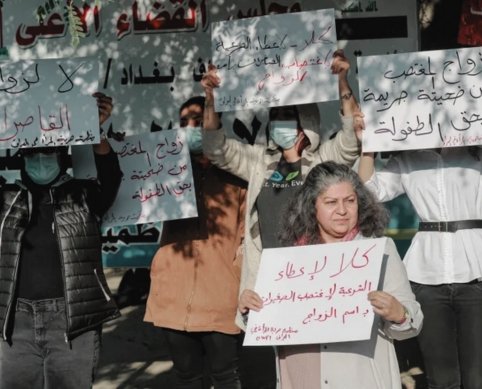Iraq Proposes Legislation to Lower the Legal Marriage Age for Girls to 9

A proposed bill in Iraq’s parliament has ignited widespread outrage and concern as it seeks to lower the legal marriage age for girls to just 9 years old. Introduced by the Iraq Justice Ministry, this controversial legislation aims to amend the country’s Personal Status Law, which currently sets the minimum marriage age at 18.
The bill would permit citizens to choose between religious authorities and the civil judiciary to handle family matters. Critics worry this could lead to a reduction in rights concerning inheritance, divorce, and child custody.
If enacted, the bill would enable girls as young as 9 and boys as young as 15 to marry, raising alarms about a potential increase in child marriage and exploitation. Opponents argue that this regressive measure threatens to reverse decades of progress in advancing women’s rights and gender equality.
Human rights organizations, women’s groups, and civil society activists have strongly condemned the bill, highlighting the severe repercussions it could have on young girls’ education, health, and overall well-being. They argue that child marriage contributes to higher dropout rates, early pregnancies, and an increased risk of domestic violence.
UNICEF reports that 28 percent of girls in Iraq are already married before they turn 18.
“Enacting this law would signal a regression rather than progress,” said Sarah Sanbar, a researcher at Human Rights Watch (HRW).
Amal Kabashi from the Iraq Women’s Network also expressed strong opposition, arguing that the amendment “grants excessive authority to men over family matters” in an already conservative society.
In late July, the parliament withdrew the proposed changes following significant objections from lawmakers. However, the bill reappeared in a session on August 4 after gaining backing from influential Shia blocs that dominate the chamber.
The proposed amendments would reverse the 1959 legislation, which transferred family law authority from religious leaders to the state judiciary following the fall of the Iraqi monarchy. The new bill would reintroduce religious rules, primarily from Shia and Sunni Islam, but does not address other religious or sectarian groups within Iraq’s diverse population.
Supporters of the bill argue that it aims to harmonize Islamic law and protect young girls from “immoral relationships.” However, critics argue that this rationale is flawed and disregards the harsh realities of child marriage.
By shifting marriage authority to religious figures, the amendment could “undermine the principle of equality under Iraqi law,” according to HRW’s Sanbar.
It also “could legitimize the marriage of girls as young as nine, compromising the futures and well-being of many young girls.”
“Girls should be in schools and on playgrounds, not in wedding dresses,” Sanbar added.
It remains uncertain whether this attempt to change the law will succeed where previous efforts have failed.









